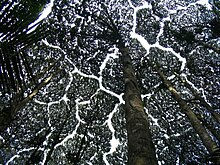Dryobalanops aromatica
| Dryobalanops aromatica | |
|---|---|
 |
|
| Canopy of D. aromatica in the Forest Research Institute Malaysia, Kuala Lumpur displaying crown shyness | |
| Scientific classification | |
| Kingdom: | Plantae |
| (unranked): | Angiosperms |
| (unranked): | Eudicots |
| (unranked): | Rosids |
| Order: | Malvales |
| Family: | Dipterocarpaceae |
| Genus: | Dryobalanops |
| Species: | D. aromatica |
| Binomial name | |
|
Dryobalanops aromatica Gaertn.f., nom cons. |
|
| Synonyms | |
Dryobalanops aromatica, commonly known as Borneo camphor, camphor tree, Malay camphor, or Sumatran camphor, is a species of plant in the Dipterocarpaceae family. The species name aromatica is derived from Latin (aromaticus = spice-like) and refers to the smell of the dammar (resin). This species was one of the main sources of camphor and attracted early Arab traders to Borneo, at that time being worth more than gold, and used for incense and perfumes.
It is found in Sumatra, Peninsular Malaysia and Borneo.
It is a large emergent tree, up to 65 m or even 75 m tall, found in mixed dipterocarp forests on deep humic yellow sandy soils. It is a heavy hardwood sold under the trade names of Kapur. It is recorded from at least two protected areas (Lambir and Gunung Mulu National Parks).
Bergenin, malaysianol A, laevifonol, ampelopsin E, α-viniferin, ε-viniferin and diptoindonesin A can be isolated from the stem bark of D. aromatica.
D. aromatica is one of several tree species known to exhibit a behavior called crown shyness.
...
Wikipedia

